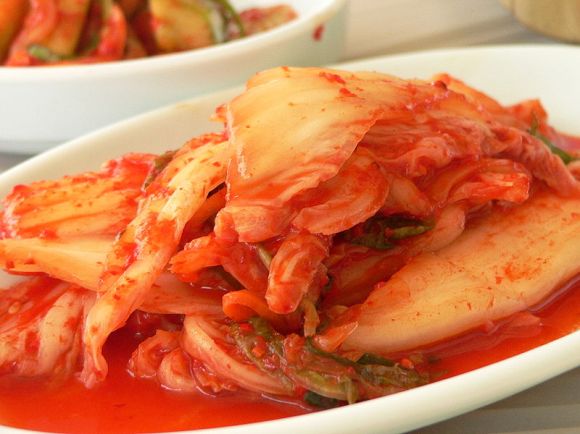
America throws the best linguistic hissy fits when political relationships sour. Remember when Congress tried to change French fries to “freedom fries” because France didn’t want to come along on the Iraq invasion? Or how about when sauerkraut became so unpopular during World War I that makers suggested changing the name to the less Germanic “liberty cabbage”? Good times.
Well, it may be that the Yanks aren’t the only ones who want suitably patriotic cabbage. In Korea, it looks like Chinese cabbage, the vegetable used to make the most common variety of kimchi, is now being referred to as “kimchi cabbage” or just “cabbage”.
This year the Korean government submitted an application to have kimchi and gimjang, an annual winter event where it is made and shared, given the UNESCO Intangible Cultural Heritage of Humanity designation when the group meets in December. In the official UNESCO application documents, the cabbage is never referred to as “Chinese cabbage”, although that is a common designation around the world. Instead “napa cabbage” or just “cabbage” are used.
Now Chinese media is reporting that English materials related to the bid that are used inside Korea are calling the vegetable “kimchi cabbage.” The response there has been quite negative, as some feel Korea has unfairly claimed traditions originating in China such as Chinese medicine and Children’s Day as Korean.
A professor from Fudan University in Shanghai was quoted as saying, “Historically, the Korean Peninsula was part of China for a long time. Korean people are just propagating Chinese culture in our place.”
This is likely a tempest in a teapot–or a kimchi urn, if you will–because the term “Chinese cabbage” may have been avoided simply to avoid confusion. Although the term is commonly used to refer to napa cabbage, it is used in some regions to refer to the similar bok choy.
The UNESCO application materials themselves acknowledge that cabbage cultivation came from China, and the Korean press has responded that it is not just the kimchi, but the gimjang event that is particularly Korean. Traditionally, the ideal temperature window for making and storing kimchi was short, so communities and families gathered together to get all of the pickling done in time. Nowadays, the invention of refrigeration has meant the seasonal imperative is gone, but Korea wants to preserve the gimjang festivals and gatherings as part of their cultural heritage.

 Can you guess the most-consumed vegetable in Japan? This survey reveals the results
Can you guess the most-consumed vegetable in Japan? This survey reveals the results McDonald’s unveils latest Black Burger – the Spicy Korean Burger 【Video】
McDonald’s unveils latest Black Burger – the Spicy Korean Burger 【Video】 Make your tummy happy, eat a kimchi yogurt rice bowl today
Make your tummy happy, eat a kimchi yogurt rice bowl today Kimchi cocktail offers a taste of Korea that no Korean would actually endorse
Kimchi cocktail offers a taste of Korea that no Korean would actually endorse Newest Japanese vending machine crush: Keikyu’s kimchi vending machine!【Taste test】
Newest Japanese vending machine crush: Keikyu’s kimchi vending machine!【Taste test】 Red light district sushi restaurant in Tokyo shows us just how wrong we were about it
Red light district sushi restaurant in Tokyo shows us just how wrong we were about it Pokémon Sleep camping suite and guestrooms coming to Tokyo Hyatt along with giant Snorlax burgers
Pokémon Sleep camping suite and guestrooms coming to Tokyo Hyatt along with giant Snorlax burgers Sandwiches fit for a sumo served up in Osaka【Taste Test】
Sandwiches fit for a sumo served up in Osaka【Taste Test】 McDonald’s new Happy Meals offer up cute and practical Sanrio lifestyle goods
McDonald’s new Happy Meals offer up cute and practical Sanrio lifestyle goods Tokyo Tsukiji fish market site to be redeveloped with 50,000-seat stadium, hotel, shopping center
Tokyo Tsukiji fish market site to be redeveloped with 50,000-seat stadium, hotel, shopping center Akihabara pop-up shop sells goods made by Japanese prison inmates
Akihabara pop-up shop sells goods made by Japanese prison inmates Starbucks Japan adds a Motto Frappuccino to the menu for a limited time
Starbucks Japan adds a Motto Frappuccino to the menu for a limited time Japanese ramen restaurants under pressure from new yen banknotes
Japanese ramen restaurants under pressure from new yen banknotes Beautiful Red and Blue Star luxury trains set to be Japan’s new Hokkaido travel stars
Beautiful Red and Blue Star luxury trains set to be Japan’s new Hokkaido travel stars Anime girl English teacher Ellen-sensei becomes VTuber/VVTUber and NFT
Anime girl English teacher Ellen-sensei becomes VTuber/VVTUber and NFT All-you-can-drink Starbucks and amazing views part of Tokyo’s new 170 meter-high sky lounge
All-you-can-drink Starbucks and amazing views part of Tokyo’s new 170 meter-high sky lounge More foreign tourists than ever before in history visited Japan last month
More foreign tourists than ever before in history visited Japan last month French Fries Bread in Tokyo’s Shibuya becomes a hit on social media
French Fries Bread in Tokyo’s Shibuya becomes a hit on social media Studio Ghibli releases new action figures featuring Nausicaä of the Valley of the Wind characters
Studio Ghibli releases new action figures featuring Nausicaä of the Valley of the Wind characters New private rooms on Tokaido Shinkansen change the way we travel from Tokyo to Kyoto
New private rooms on Tokaido Shinkansen change the way we travel from Tokyo to Kyoto Starbucks reopens at Shibuya Scramble Crossing with new look and design concept
Starbucks reopens at Shibuya Scramble Crossing with new look and design concept Studio Ghibli glasses cases let anime characters keep an eye on your spectacles
Studio Ghibli glasses cases let anime characters keep an eye on your spectacles Beautiful Ghibli sealing wax kits let you create accessories and elegant letter decorations【Pics】
Beautiful Ghibli sealing wax kits let you create accessories and elegant letter decorations【Pics】 Studio Ghibli releases Kiki’s Delivery Service chocolate cake pouches in Japan
Studio Ghibli releases Kiki’s Delivery Service chocolate cake pouches in Japan New definition of “Japanese whiskey” goes into effect to prevent fakes from fooling overseas buyers
New definition of “Japanese whiskey” goes into effect to prevent fakes from fooling overseas buyers Our Japanese reporter visits Costco in the U.S., finds super American and very Japanese things
Our Japanese reporter visits Costco in the U.S., finds super American and very Japanese things Studio Ghibli unveils Mother’s Day gift set that captures the love in My Neighbour Totoro
Studio Ghibli unveils Mother’s Day gift set that captures the love in My Neighbour Totoro New Japanese KitKat flavour stars Sanrio characters, including Hello Kitty
New Japanese KitKat flavour stars Sanrio characters, including Hello Kitty New Pokémon cakes let you eat your way through Pikachu and all the Eevee evolutions
New Pokémon cakes let you eat your way through Pikachu and all the Eevee evolutions Disney princesses get official manga makeovers for Manga Princess Cafe opening in Tokyo
Disney princesses get official manga makeovers for Manga Princess Cafe opening in Tokyo Sales of Japan’s most convenient train ticket/shopping payment cards suspended indefinitely
Sales of Japan’s most convenient train ticket/shopping payment cards suspended indefinitely Sold-out Studio Ghibli desktop humidifiers are back so Totoro can help you through the dry season
Sold-out Studio Ghibli desktop humidifiers are back so Totoro can help you through the dry season Japanese government to make first change to romanization spelling rules since the 1950s
Japanese government to make first change to romanization spelling rules since the 1950s Ghibli founders Toshio Suzuki and Hayao Miyazaki contribute to Japanese whisky Totoro label design
Ghibli founders Toshio Suzuki and Hayao Miyazaki contribute to Japanese whisky Totoro label design Doraemon found buried at sea as scene from 1993 anime becomes real life【Photos】
Doraemon found buried at sea as scene from 1993 anime becomes real life【Photos】 Tokyo’s most famous Starbucks is closed
Tokyo’s most famous Starbucks is closed One Piece characters’ nationalities revealed, but fans have mixed opinions
One Piece characters’ nationalities revealed, but fans have mixed opinions We asked a Uniqlo employee what four things we should buy and their suggestions didn’t disappoint
We asked a Uniqlo employee what four things we should buy and their suggestions didn’t disappoint Princesses, fruits, and blacksmiths: Study reveals the 30 most unusual family names in Japan
Princesses, fruits, and blacksmiths: Study reveals the 30 most unusual family names in Japan Local tourism center in northern Japan makes visitors feel like they’ve crossed over into Korea
Local tourism center in northern Japan makes visitors feel like they’ve crossed over into Korea Do you know what this caterpillar-like food is? We had no idea!【Taste test】
Do you know what this caterpillar-like food is? We had no idea!【Taste test】 Chinese restaurant has the most epic English menu of all time
Chinese restaurant has the most epic English menu of all time How to make okonomiyaki at home【SoraKitchen】
How to make okonomiyaki at home【SoraKitchen】 The dirty reason China can’t always tell North Korea what to do
The dirty reason China can’t always tell North Korea what to do Anti-Japanese protestors “execute” effigy of Prime Minister Abe with ISIS-style beheading 【Video】
Anti-Japanese protestors “execute” effigy of Prime Minister Abe with ISIS-style beheading 【Video】 Korean drama advances slap technology with ancient Korean recipe
Korean drama advances slap technology with ancient Korean recipe Homemade seaweed & milk face packs—the secret to healthier skin?【Video】
Homemade seaweed & milk face packs—the secret to healthier skin?【Video】 Japan petitions to add 40 traditional folk dances to UNESCO’s Intangible Cultural Heritage list
Japan petitions to add 40 traditional folk dances to UNESCO’s Intangible Cultural Heritage list Inside the luxury Chinese hotel where North Korea keeps its army of hackers
Inside the luxury Chinese hotel where North Korea keeps its army of hackers Beautiful YouTuber shows Japanese and Korean makeup trend differences in half-faced comparison
Beautiful YouTuber shows Japanese and Korean makeup trend differences in half-faced comparison Microsoft’s Windows 10 ads inadvertently ruffle feathers in Korea with… a bad choice of font?
Microsoft’s Windows 10 ads inadvertently ruffle feathers in Korea with… a bad choice of font? Korean man arrested for boiling 600 cats alive, selling the meat for use in soup
Korean man arrested for boiling 600 cats alive, selling the meat for use in soup Tokyo yakiniku restaurant begins offering halal course meals for Islamic diners
Tokyo yakiniku restaurant begins offering halal course meals for Islamic diners Do people in Osaka really eat crunchy fried noodles with curry? We ask a local, then try it out
Do people in Osaka really eat crunchy fried noodles with curry? We ask a local, then try it out
Leave a Reply